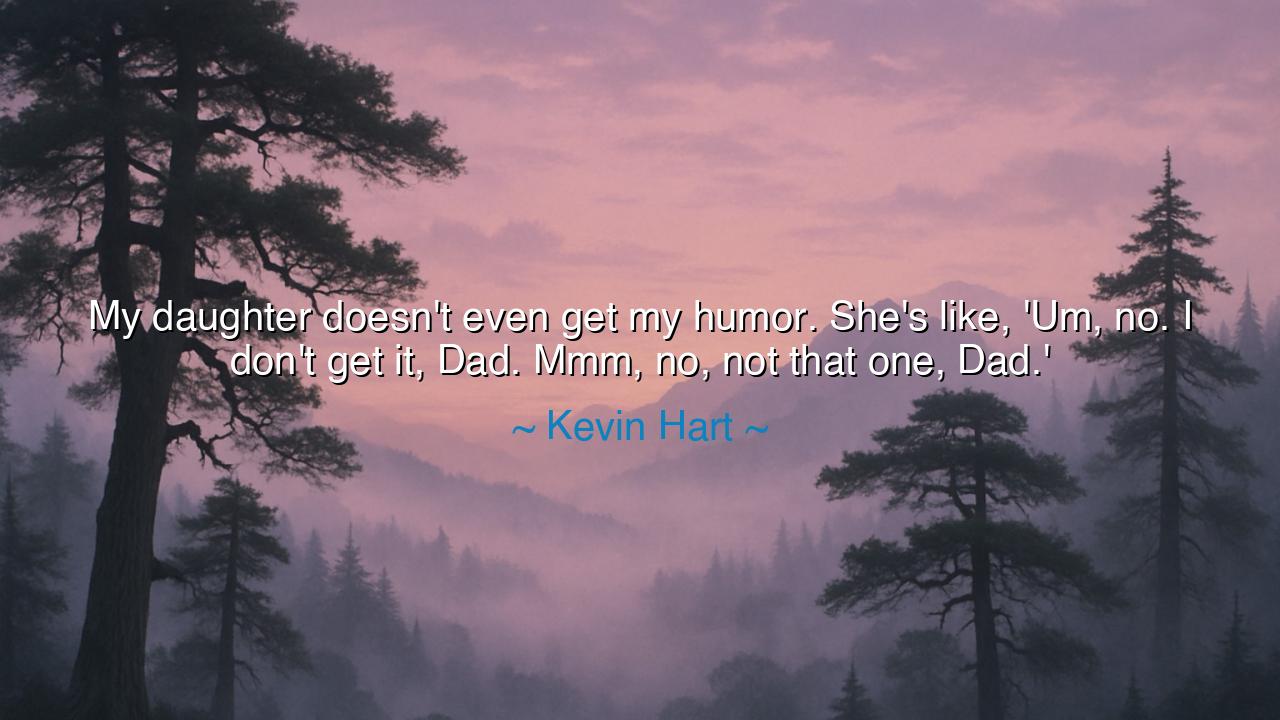
My daughter doesn't even get my humor. She's like, 'Um, no. I
My daughter doesn't even get my humor. She's like, 'Um, no. I don't get it, Dad. Mmm, no, not that one, Dad.'






In the grand tapestry of life, where the passing of time shapes both the wisdom and the humor of each generation, there is a deep and often humorous truth that emerges—humor is both a bond and a barrier between those who share it. Kevin Hart, in his reflection on the generational gap, offers this insight: "My daughter doesn't even get my humor. She's like, 'Um, no. I don't get it, Dad. Mmm, no, not that one, Dad.'" In these words, Hart touches upon a timeless reality: humor, like so many aspects of life, is subjective and shaped by the lens through which it is viewed. The very generations that raise us, guide us, and impart wisdom also offer us a window into the ever-changing nature of the world.
In the ancient world, the concept of humor was deeply tied to age, wisdom, and the shifting dynamics between the young and the old. The philosopher Socrates would often challenge the youth of Athens with his dialogues, testing their understanding of truth, reason, and life’s absurdities. His humor, sharp and insightful, often left the young perplexed—just as Kevin Hart’s humor, rooted in the experiences of his generation, fails to resonate with the innocence and perspective of his daughter. The age gap, then, is not just a generational divide in knowledge, but in the very way humor is experienced. Socrates’ humor was often lost on those not yet seasoned by life, just as Hart’s humor is perceived differently by the younger generation.
The great writers of antiquity also observed the way humor varied across ages. Aristophanes, the master of ancient Greek comedy, often used humor to critique the older generation’s failings while giving voice to the hopes and frustrations of the youth. His characters, though often exaggerated, embodied a clash of perspectives between the old and the new, between the traditional and the modern. Hart’s playful frustration with his daughter’s inability to understand his humor echoes this age-old conflict: as the generations pass, humor evolves and diverges, shaped by the worldviews and experiences of those who live in each age. Hart’s humor, grounded in his own time and context, feels distant to a younger mind not yet acquainted with the same cultural references and life experiences.
Consider the humor found in ancient epic tales—where the great heroes, such as Odysseus, often used wit and cleverness to navigate their trials. His humor was deeply tied to his wisdom, his experiences, and the challenges he faced. It was humor born from struggle and victory, something that the younger, less-experienced characters in the tale could not fully comprehend. Hart’s daughter, like the youth of ancient tales, lives in a world far different from that of her father. Her perspective on humor is informed by her own generation’s unique experiences, and thus, what Hart finds funny is not always something she can grasp, just as Odysseus’ humor might have been lost on those not yet weathered by life’s storms.
This interplay between the old and the new—this clash of humor—is a universal truth: every generation crafts its own sense of humor, shaped by its culture, history, and circumstances. Humor, in this sense, is not static; it is a living reflection of the times in which it is born. Hart’s humor, though deeply personal, is also shaped by the world he inhabits, a world full of technological advances, social change, and new understandings of identity and culture. Yet, his daughter, still young and forming her own view of the world, is not yet attuned to the subtleties of his generation’s humor. This is not a failure of understanding, but a natural result of the passing of time and the evolution of the human experience.
The lesson here is clear: humor—though deeply personal—is also a reflection of the times we live in. We must acknowledge that our humor is shaped not only by our own experiences, but also by the generations that came before us. Just as Socrates’ humor puzzled the youth of Athens, and Hart’s humor is misunderstood by his daughter, so too will our own humor be experienced differently by those who come after us. This does not mean we should be discouraged or frustrated, but rather that we should embrace the inevitable differences in how humor is experienced. It is a gift that allows us to connect across generations, but it also teaches us the importance of context—that the humor of one generation is often a reflection of the world they know.
Let us, then, take this wisdom into our own lives. When we speak, write, or share our humor, we must recognize the distance that may exist between our perspectives and those of the younger or older generations. Rather than feeling disconnected, we must celebrate the richness of this difference, recognizing that the humor of one generation adds to the tapestry of life. Just as Socrates used humor to spark reflection in the youth of Athens, and Hart uses humor to entertain and connect with his audience, let us use humor as a bridge—not only between generations, but between hearts and minds. Humor, like life itself, evolves; but it is in that evolution that we find the greatest connections and understandings.






AAdministratorAdministrator
Welcome, honored guests. Please leave a comment, we will respond soon